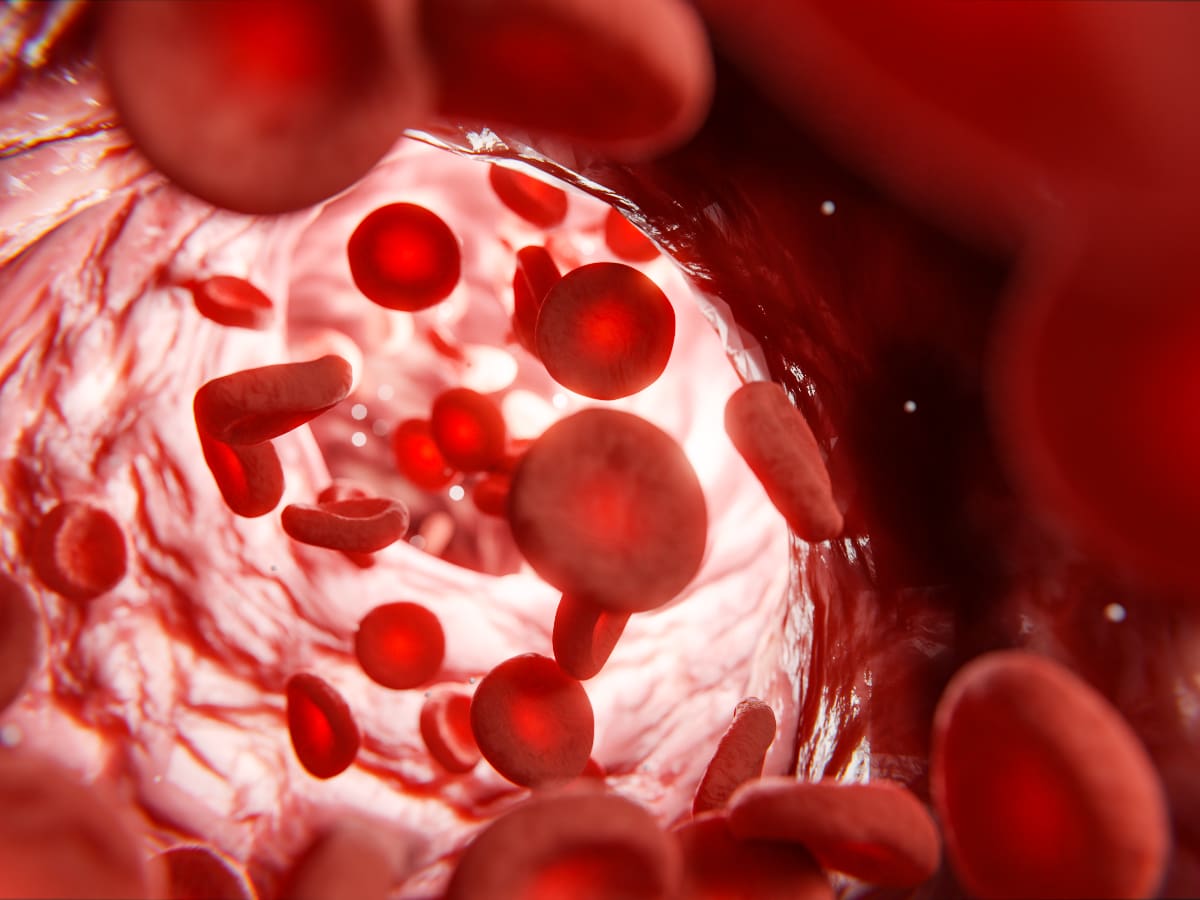Nitric oxide is a molecule that plays a crucial role in maintaining cardiovascular health. It acts as a signaling molecule in the body, exerting various physiological effects, particularly in the cardiovascular system. The discovery of its role in cardiovascular function earned a Nobel Prize in Physiology or Medicine in 1998, highlighting its significance in medical science.
The human body naturally produces nitric oxide through enzymatic processes, primarily in the endothelial cells lining the inner walls of blood vessels. Here, it serves as a potent vasodilator, meaning it relaxes and widens blood vessels, thereby improving blood flow and reducing blood pressure. Additionally, nitric oxide helps regulate various aspects of cardiovascular function, including platelet aggregation, inflammation, and vascular remodeling.
Despite its vital role, nitric oxide levels can be influenced by lifestyle factors such as diet, exercise, and exposure to environmental stressors. Understanding how these factors impact nitric oxide production can inform strategies for maintaining cardiovascular health.

Throughout this article, we will explore the benefits of nitric oxide for cardiovascular health, including its role in vasodilation, blood pressure regulation, prevention of atherosclerosis, and anti-inflammatory effects. We will also discuss dietary sources of nitric oxide precursors, the effectiveness of nitric oxide supplements, and lifestyle factors that can enhance nitric oxide production.
Understanding Nitric Oxide
Nitric oxide (NO) is a remarkable molecule with profound implications for cardiovascular health. Discovered in the late 20th century, it was initially identified for its role as a vasodilator, meaning it relaxes and widens blood vessels. However, its functions extend far beyond mere blood vessel regulation.
Nitric oxide is a gas molecule produced by various cells throughout the body, particularly endothelial cells lining the inner walls of blood vessels. It's synthesized from the amino acid L-arginine by the enzyme nitric oxide synthase (NOS).
Once produced, nitric oxide acts as a signaling molecule, influencing numerous physiological processes, including neurotransmission, immune response, and most notably, cardiovascular function.
Nitric Oxide Production
The production of nitric oxide in the body involves a complex enzymatic process. Endothelial NOS (eNOS) is the primary enzyme responsible for generating nitric oxide in endothelial cells, while neuronal NOS (nNOS) and inducible NOS (iNOS) are found in other tissues and play roles in specific physiological conditions.
Stimuli such as shear stress from blood flow, neurotransmitters like acetylcholine, and hormones like insulin trigger the activation of eNOS, leading to the synthesis of nitric oxide.
Role of Nitric Oxide in Blood Vessel Function:
 The primary function of nitric oxide in cardiovascular health is its ability to induce vasodilation. When released by endothelial cells, nitric oxide diffuses into the underlying smooth muscle cells of blood vessels, causing relaxation and widening of the vessel lumen.
The primary function of nitric oxide in cardiovascular health is its ability to induce vasodilation. When released by endothelial cells, nitric oxide diffuses into the underlying smooth muscle cells of blood vessels, causing relaxation and widening of the vessel lumen.
Vasodilation initiated by nitric oxide results in increased blood flow to tissues, decreased peripheral resistance, and ultimately helps regulate blood pressure. Additionally, nitric oxide inhibits platelet aggregation and adhesion, preventing the formation of blood clots and maintaining vascular homeostasis.
Beyond vasodilation, nitric oxide also exhibits antioxidant and anti-inflammatory properties, protecting blood vessels from oxidative stress and inflammation, which are key factors in the development of cardiovascular diseases such as atherosclerosis.
Nitric Oxide and Cardiovascular Health
Nitric oxide (NO) plays a vital role in maintaining cardiovascular health by regulating various physiological processes. As a signaling molecule, NO is produced by endothelial cells lining the blood vessels, where it exerts its effects on vascular tone, blood pressure, and inflammation.
- Vasodilation: Nitric oxide acts as a potent vasodilator, meaning it relaxes the smooth muscle cells in blood vessel walls, leading to dilation. This dilation increases blood flow and reduces resistance in the arteries, thus improving circulation throughout the body. By promoting vasodilation, NO helps regulate blood pressure and ensures adequate delivery of oxygen and nutrients to tissues.
- Regulation of Blood Pressure: The ability of nitric oxide to dilate blood vessels also contributes to its role in regulating blood pressure. NO helps maintain blood pressure within a healthy range by modulating the tone of the blood vessels. When blood pressure rises, NO production increases, causing vasodilation and lowering blood pressure. Conversely, when blood pressure drops, NO production decreases, allowing vessels to constrict and raise blood pressure back to normal levels.
- Prevention of Atherosclerosis: Atherosclerosis is a condition characterized by the buildup of plaque in the arteries, leading to narrowing and hardening of the vessel walls. Nitric oxide plays a crucial role in preventing the development of atherosclerosis through several mechanisms. Firstly, NO inhibits the adhesion of white blood cells to the endothelium, reducing inflammation and preventing the initial stages of plaque formation. Additionally, NO prevents the proliferation of smooth muscle cells in the arterial wall, which can contribute to plaque buildup. Furthermore, NO helps maintain the integrity of the endothelial lining, preventing damage that can trigger the formation of plaques.
- Anti-inflammatory Properties: Inflammation is a key driver of cardiovascular disease, contributing to endothelial dysfunction, plaque formation, and arterial stiffness. Nitric oxide exhibits anti-inflammatory effects within the blood vessels, helping to counteract inflammatory processes that contribute to cardiovascular pathology. NO inhibits the expression of adhesion molecules and pro-inflammatory cytokines, thereby reducing the recruitment of immune cells and dampening the inflammatory response. By mitigating inflammation, NO helps preserve vascular function and reduces the risk of cardiovascular events.
Benefits of Nitric Oxide Supplementation
Nitric oxide supplementation has gained significant attention in recent years for its potential benefits in promoting cardiovascular health. While the body naturally produces nitric oxide, supplementation can provide additional support, especially in people with compromised nitric oxide production or those seeking to optimize their cardiovascular function.
Dietary sources of nitric oxide precursors
 One way to enhance nitric oxide levels is through dietary intake of nitric oxide precursors. Foods rich in nitrates and nitrites, such as leafy green vegetables (e.g., spinach, kale, arugula), beets, and certain fruits (e.g., berries, citrus fruits), can provide the raw materials needed for nitric oxide synthesis. Additionally, foods high in amino acids like arginine and citrulline, such as nuts, seeds, legumes, and seafood, can also support nitric oxide production.
One way to enhance nitric oxide levels is through dietary intake of nitric oxide precursors. Foods rich in nitrates and nitrites, such as leafy green vegetables (e.g., spinach, kale, arugula), beets, and certain fruits (e.g., berries, citrus fruits), can provide the raw materials needed for nitric oxide synthesis. Additionally, foods high in amino acids like arginine and citrulline, such as nuts, seeds, legumes, and seafood, can also support nitric oxide production.
Nitric oxide supplements: Types and effectiveness
Nitric oxide supplements typically come in the form of nitric oxide precursors or compounds that support nitric oxide synthesis. Common supplements include arginine, citrulline, and beetroot extract. These supplements are believed to increase nitric oxide production in the body, leading to improved blood flow, reduced blood pressure, and enhanced cardiovascular function.
Research suggests that nitric oxide supplementation may have various cardiovascular benefits. For example, a study published in the American Journal of Hypertension found that supplementation with beetroot juice, a rich source of dietary nitrates, significantly lowered blood pressure in people with hypertension. Another study in the Journal of the American College of Cardiology demonstrated that supplementation with arginine improved endothelial function, a key determinant of cardiovascular health.
Lifestyle Factors Affecting Nitric Oxide Production
Nitric oxide (NO) production in the body is not solely dependent on genetic factors; lifestyle choices also play a significant role. Understanding and incorporating lifestyle habits that promote NO synthesis can contribute to better cardiovascular health.
Importance of Exercise
 Regular physical activity is one of the most effective ways to enhance nitric oxide production. Exercise stimulates the endothelial cells lining the blood vessels, prompting them to release more NO. This vasodilatory effect helps to improve blood flow and lower blood pressure. Both aerobic and resistance training have been shown to increase NO levels, highlighting the importance of incorporating a variety of exercises into your routine.
Regular physical activity is one of the most effective ways to enhance nitric oxide production. Exercise stimulates the endothelial cells lining the blood vessels, prompting them to release more NO. This vasodilatory effect helps to improve blood flow and lower blood pressure. Both aerobic and resistance training have been shown to increase NO levels, highlighting the importance of incorporating a variety of exercises into your routine.
Furthermore, consistent exercise promotes the health of the endothelium, the inner lining of blood vessels, which is crucial for optimal NO production. Endothelial dysfunction, often seen in sedentary people, is associated with reduced NO bioavailability and increased risk of cardiovascular disease. By engaging in regular physical activity, you not only boost NO levels but also support overall cardiovascular health.
Dietary Considerations
Certain dietary components can influence nitric oxide synthesis by providing the necessary precursors and antioxidants. Foods rich in nitrates, such as leafy greens (e.g., spinach, arugula, kale), beets, and root vegetables, can enhance NO production. Once ingested, nitrates are converted into nitrites by bacteria in the mouth and then further metabolized into nitric oxide in the body.
In addition to nitrates, supplements containing antioxidants found in fruits, vegetables, and nuts can help preserve nitric oxide levels by protecting it from oxidative degradation. Including a variety of colorful fruits and vegetables in your diet ensures an adequate intake of these beneficial compounds.
Other Lifestyle Habits

- Smoking Cessation: Smoking is known to impair nitric oxide production and function, contributing to endothelial dysfunction and increased cardiovascular risk. Quitting smoking can lead to significant improvements in NO bioavailability and vascular function, reducing the risk of cardiovascular events.
- Stress Management: Chronic stress can adversely affect nitric oxide levels by promoting inflammation and oxidative stress, which impair endothelial function. Practicing stress-reduction techniques such as mindfulness, meditation, yoga, and deep breathing exercises can help mitigate these effects and support NO synthesis.
- Adequate Sleep: Sleep plays a vital role in cardiovascular health and nitric oxide regulation. Poor sleep quality and insufficient sleep duration have been linked to endothelial dysfunction and decreased NO production. Prioritizing good sleep hygiene, aiming for 7-9 hours of quality sleep per night, can positively impact NO levels and overall cardiovascular health.
Clinical Applications and Future Directions
Nitric oxide therapy in cardiovascular diseases: Current uses and ongoing research
Nitric oxide has emerged as a promising therapeutic target for various cardiovascular diseases due to its vasodilatory, anti-inflammatory, and antiplatelet effects. Currently, nitric oxide therapy is primarily used in clinical settings for conditions such as pulmonary hypertension and neonatal hypoxic respiratory failure. Inhaled nitric oxide (iNO) is administered to dilate pulmonary blood vessels, improve oxygenation, and reduce pulmonary artery pressure in patients with pulmonary hypertension, acute respiratory distress syndrome (ARDS), and other respiratory conditions.
Ongoing research is exploring the potential applications of nitric oxide in other cardiovascular diseases. Clinical trials are investigating the use of nitric oxide donors and NO-releasing drugs in conditions such as heart failure, ischemic heart disease, and peripheral artery disease. These studies aim to elucidate the therapeutic benefits of enhancing nitric oxide levels in improving endothelial function, reducing vascular inflammation, and mitigating the progression of atherosclerosis.
Potential implications for nitric oxide in treating conditions like hypertension, heart failure, and peripheral artery disease
 Hypertension, heart failure, and peripheral artery disease are major contributors to cardiovascular morbidity and mortality worldwide. Nitric oxide plays a crucial role in regulating blood pressure, cardiac function, and peripheral vascular tone, making it an attractive target for therapeutic intervention in these conditions.
Hypertension, heart failure, and peripheral artery disease are major contributors to cardiovascular morbidity and mortality worldwide. Nitric oxide plays a crucial role in regulating blood pressure, cardiac function, and peripheral vascular tone, making it an attractive target for therapeutic intervention in these conditions.
In hypertension, impaired nitric oxide bioavailability contributes to endothelial dysfunction and vasoconstriction, leading to elevated blood pressure. Strategies aimed at enhancing nitric oxide production or activity, such as dietary nitrate supplementation, nitric oxide donors, or inhibitors of nitric oxide degradation enzymes, hold promise for lowering blood pressure and improving vascular health in hypertensive patients.
Heart failure is characterized by impaired cardiac function and systemic vasoconstriction, leading to reduced cardiac output and tissue perfusion. Nitric oxide therapy may help alleviate symptoms of heart failure by promoting vasodilation, reducing cardiac preload and afterload, and improving myocardial contractility. Additionally, nitric oxide-mediated inhibition of platelet aggregation and thrombosis may confer cardioprotective effects in heart failure patients at risk of thromboembolic events.
Peripheral artery disease (PAD) is characterized by reduced blood flow to the extremities due to atherosclerotic occlusion of peripheral arteries. Nitric oxide plays a vital role in regulating vascular tone and blood flow in peripheral arteries. Therapeutic strategies aimed at enhancing nitric oxide bioavailability, such as nitric oxide donors or endothelial nitric oxide synthase (eNOS) activators, may improve endothelial function, promote vasodilation, and enhance exercise tolerance in PAD patients.
Frequently Asked Questions
What is nitric oxide, and why is it important for cardiovascular health?
Nitric oxide (NO) is a molecule produced naturally in the body that plays a crucial role in regulating blood vessel function and blood pressure. It helps in dilating blood vessels, improving blood flow, and reducing inflammation, all of which are essential for maintaining a healthy cardiovascular system.
How can I naturally boost nitric oxide levels in my body?
 You can enhance nitric oxide levels through various lifestyle choices such as regular exercise, consuming a diet rich in nitric oxide precursors like leafy greens, beets, and garlic, and minimizing factors that inhibit its production such as smoking and stress.
You can enhance nitric oxide levels through various lifestyle choices such as regular exercise, consuming a diet rich in nitric oxide precursors like leafy greens, beets, and garlic, and minimizing factors that inhibit its production such as smoking and stress.
Are there any supplements available to increase nitric oxide levels?
Yes, there are supplements available that contain ingredients known to boost nitric oxide production, such as L-arginine, L-citrulline, and beetroot extract. These supplements can help support cardiovascular health, but it's essential to consult with a healthcare professional before starting any new supplement regimen.
What are the benefits of nitric oxide for heart disease prevention?
Nitric oxide helps prevent heart disease by promoting healthy blood vessel function, reducing the risk of plaque buildup in arteries (atherosclerosis), regulating blood pressure, and decreasing inflammation. These mechanisms collectively contribute to lowering the risk of developing cardiovascular diseases such as heart attacks and strokes.
Can nitric oxide therapy be used to treat cardiovascular conditions?
Nitric oxide therapy is used clinically to treat certain cardiovascular conditions such as pulmonary hypertension and heart failure. Additionally, ongoing research is exploring its potential applications in managing other cardiovascular diseases like hypertension, peripheral artery disease, and coronary artery disease. However, it's crucial to consult with a healthcare professional for personalized treatment recommendations.
Conclusion
Nitric oxide stands as a vital player in maintaining optimal cardiovascular health, acting as a multifaceted regulator of blood vessel function, blood pressure, and inflammation. Throughout this exploration, it becomes evident that understanding and leveraging the benefits of nitric oxide can significantly contribute to our overall well-being.
From its role in vasodilation to its potential in preventing atherosclerosis and reducing inflammation, nitric oxide emerges as a powerful ally in the fight against cardiovascular diseases. Moreover, the accessibility of nitric oxide precursors through diet and supplementation provides avenues for people to proactively support their cardiovascular health.
Regular exercise, a balanced diet rich in nitric oxide precursors and antioxidants, along with healthy habits such as smoking cessation, stress management, and adequate sleep, can collectively enhance nitric oxide levels, thereby promoting cardiovascular wellness.
Watch AFIL test kits testimonial videos click here
References
- Paulus, Walter J. "The role of nitric oxide in the failing heart." Heart failure reviews 6 (2001): 105-118.
- Chowdhary, Saqib, et al. "Nitric oxide and cardiac parasympathetic control in human heart failure." Clinical Science 102.4 (2002): 397-402.
- Rastaldo, Raffaella, et al. "Nitric oxide and cardiac function." Life sciences 81.10 (2007): 779-793.
- Umar, Soban, and Arnoud van der Laarse. "Nitric oxide and nitric oxide synthase isoforms in the normal, hypertrophic, and failing heart." Molecular and cellular biochemistry 333 (2010): 191-201.


.png?v=1737390083)
.png?v=1737187409)


